The University of Fukui held the practical research “Fukui Roundtable 2021 Summer Session” on June 19 and 20, 2021, as part of the Fiscal 2018 EDU-Port Japan Certified Project “Introduction of Fukui-Style Education from Japan to the World Teacher Training Collaboration Project in Asia, Africa, and Middle East”. Due to the impact of the COVID-19 pandemic, the session was implemented in a hybrid style with on-siteparticipation at the United Graduate School of Professional Development of Teachers, University of Fukui, and online participation that connected with domestic Japan and the rest of the world. Of the numerous sessions held, the International Session featured international exchanges on the theme of lesson studies based on a report by participants from Malawi.
Changes in Educational Settings in Malawi Brought About by the Fukui Roundtable
Are Education in schools in Malawi changing?
In Malawi, despite the improvement of school attendance ratios as a result of the practice of Education For All, there are still many challenges with the quantity and quality of teachers. With these circumstances in mind, two people who participated in the JICA Knowledge Co-Creation Program “Improvement of quality of education through Lesson Study” implemented at the University of Fukui in November 2016, including one mathematics teacher from a secondary school in Malawi (equivalent to a Japanese senior high school), and one official from the Department of Teacher Education and Development of the Ministry of Education, Science and Technology (responsible for secondary education mathematics), began to engage in lesson studies at the school where the teacher works once they returned to Malawi based on the effect of the JICA Knowledge Co-Creation Program. In response to their efforts, Malawi has been invited to every Roundtable since the February 2017 Fukui Roundtable, and follow-ups are being conducted by the presentation of activity reports. In addition, within the framework of EDU-Port Japan Pilot Project, activities have been implemented toward improving the practice of lesson studies, including site visits conducted by members from the University of Fukui on many occasions since October 2017. Lesson studies have been conducted with the purpose of practicing education that is focused on learning among the children at the schools. During the first visit, a lesson was observed where group study was implemented with the theme of “solving simultaneous equations,” with each group being given a paper for consideration all together. In each group, relatively capable children helped those who were having difficulty in understanding, which created an atmosphere of mutual learning among the children. The shift from lessons taught unilaterally by teachers to lessons where children learn among themselves was ground-breaking. It could be seen in a direct way that the trainees who had participated in training at the University of Fukui had taken on these ideas as their own and independently putting them into practice upon returning to Malawi, and that dynamic changes had been brought about by the continuous follow-ups conducted by the university of Fukui with the aim of supporting such activities by former trainees.
Currently, in order to further expand this movement, lesson studies are being expanded as part of teacher education and teacher training with the cooperate with Nalikule College of Education. Other than the implementation of lesson studies together with the lecturer of Nalikule College of Education and the teacher from the Demonstration school of Nalikule College of Education (secondary school) who participated in the JICA Knowledge Co-Creation Program in 2019 cooperate with theteachers from the Demonstration school of Nalikule College of Education, in 2020, an academic agreement was concluded with the Nalikule College of Education. Since it became difficult to travel to Malawi because of the COVID-19 pandemic, in addition to online Roundtable participation via Zoom, we are holding meetings and cooperating in lesson studies every week.
Required perspective in teacher training: Do not overlook changes among the children in the lessons
While lessons are being practiced where children learn proactively among themselves, on the one hand, it is no easy thing to foster the ability for teachers to reflect on the lessons. When the school invited teachers from neighboring schools and educational district school inspectors and open lessons were implemented, we noticed that the visiting teachers focused on what the lesson conductor was doing rather than the learning situation among the children. Therefore, it was proposed that a group discussion should be held among the participants after the lesson to discuss the changes in learning among the children. Through this discussion, we came to understand that while teachers in Malawi have the ideal goal of “education rooted in learning among the children,” it is the action of the teacher that tend to be observed when evaluating lessons, whereas children learning may be given no attention. Then, we review the papers produced by the children in the group activity, and the participants were given the opportunity to discuss the answers written by the children and why they had understood things in that way. Also, in these discussions, the participants brought up the topic of how learning was conducted among the children, including mutual study, for example, and we shared the ideas regarding the key points observed during the lesson.
Moreover, in Malawi, lesson studies have not yet been introduced, and lesson evaluations are handled by school inspectors from the Ministry of Education, Science and Technology. This Ministry has produced a lesson evaluation checklist, which is used by school inspectors as they travel around making evaluations. We realized that if changes among the children are to be included in lesson observation, while first of all, confirming the current learning situations among the children in practicing schools, it was necessary to have a greater awareness of evaluations country-wide while also gradually involving educational districts and the more senior school inspectors from the Ministry of Education, Science and Technology. For that reason, in view of the fact that the first requirement is an improved awareness of evaluations among all of the teachers in the school, including the principal, changes were made to the practice methodology in order to involve the principal and teachers from other subjects.
Publicizing the Outcomes from Practical Research “Fukui Roundtable 2021 Summer Sessions” and New Findings
At the practical research “Fukui Roundtable 2021 Summer Session” held at the University of Fukui on June 19 and 20, 2021, examples of roundtable practices from around the world were shared and information was exchanged. A huge number of people participated, including 676 people on the first day, and 319 on the second day.
In the International Session, first, on Day 1, representing the teachers from Malawi who actively participated in the activities mentioned above, Mr. Kondwani Vwalika from the Nalikule College of Education gave an online report about the practice of lesson studies in the Nalikule demonstration school (equivalent to a Japanese senior high school). In this presentation, in addition to giving an explanation using slides via Zoom, multiple videos were shown, including videos of the pre-recorded and edited lessons, and interviews with the teachers who implemented the lessons and Mr. Kondwani. 84 people attended this session that gathered participants from many different locations, including Uganda, Malawi, South Africa, Ghana, Egypt, Saudi Arabia, Afghanistan, the Philippines, Myanmar, India and Indonesia. The participants included people in a variety of positions, including overseas students located in Japan (including students at other Japanese universities), people who had returned to their countries after studying in Japan, and JICA former trainees. After the participants from Japan and around the world were given details about the lesson studies that had actually been practiced in Malawi, they shared what they had learned from the presentation, and exchanged opinions about future developments, etc., while reviewing the situation in their own countries in the light of their own insights into lesson studies.
Participants from the Philippines shared their experiences, stating that “even in the Philippines, lesson studies are thought of as teacher evaluations, and teachers tend to dislike the implementation of lesson studies because they fear that their own lesson practice is being criticized. On the other hand, by actually implementing lesson studies, we became aware of a lack of subject expertise and we noticed the importance of continuing to learn even after becoming a teacher.” The participants from South Africa raised the following question. “Teachers are occupied with implementing the default curriculum. They tend to be negative new things because they require a lot of time, including learning theories and constructing a methodology. In-service teachers are too busy and don’t have the time to do this, so how can lesson studies be introduced?” In addition, regarding the method of conducting lessons in each country while being impacted by COVID-19, some groups shared the idea of using television in countries where the internet usage is not widespread. After sharing the efforts made in each country, participants discussed the common point among all of them, namely, the process of trial and error with regard to the fundamental theme of “how to arouse the interest of the children in learning during the COVID-19 pandemic.” Using lesson practice in Malawi as the starting point, we all became aware that, despite the different circumstances in the educational settings in each country, there are common issues.
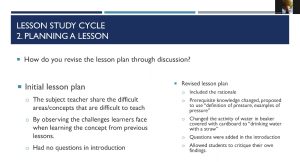
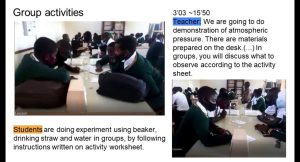
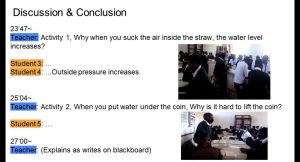
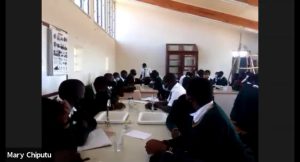
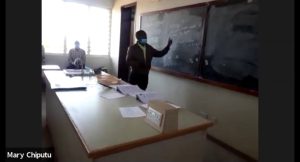
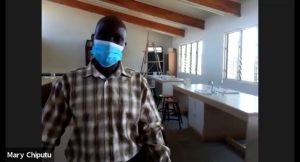
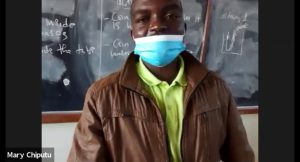
Photos (from left to right) Image 1: Presentation on Zoom (speaker shown on top-right) Image 2: Lesson explanation (1) Image 3: Lesson explanation (2) Image 4: Students during the lesson Image 5: Teacher during the practice lesson Image 6: Post-lesson interview (adviser) Image 7: Post-lesson interview (lesson conductor)
Every year, in Day 2 of the Roundtable, teachers share their practice experiences, and hold a conversation and listen actively in small groups. Exchanges were held among the international participants, who had been divided into five groups, with the presenters primarily being graduate students of the United Graduate School of Professional Development of Teachers who are also working as assistant language teachers (ALT) in prefectural schools and overseas students enrolled in teacher training programs (Professional Development of Teachers) who belong to the compulsory education school affiliated with the University of Fukui.
The attraction of the Fukui Roundtable
Common issues around the world include “how can we make more effective lesson studies to ensure that even busy teachers can conduct it?” and “what lessons are needed in order to increase the capabilities of the children.” Also, each country worldwide is still in the trial-and-error stage of changing the educational method from being content-based to competency-based. Depending on the educational system, there are different challenges being faced by each of the participants, but there are also many common points.
Among the participants, there were those who participated with the idea of getting the “right answer,” but even we as the organizers do not have a clear answer. Because education does not have “right answers” that are immediately discernible, the attraction of the Fukui Roundtable is that it embodies the idea of “an Interaction of theory and practice,” in that participants openly share and discuss their concerns and difficulties with regard to their experiences, interpret what they have learned in their own way, put it into practice in their respective countries, and exchange those results at the next Roundtable where they discover new things. Participants are also energized for future practice by having others listen carefully to their own experiences and outcomes. Not only do teachers “copy” lessons but also we believe that using the experiences and ideas of other teachers to think and consider things for oneself and linking that to future practice will lead to an improvement in the quality of education.
At the University of Fukui, we will continue to engage in “Fukui Roundtable” practical research.
*The next Roundtable Session is scheduled for February 2022 (scheduled for February 19 (Sat.) – 20 (Sun.), 2022; the format (online or in person is under consideration).
The details will be posted on the following university webpage once determined. We welcome the participation of all those who are interested.
https://www.fu-edu.net/
Reference:
University of Fukui News Letter No.149 (June 19, 2021) (P9 is written in English)







